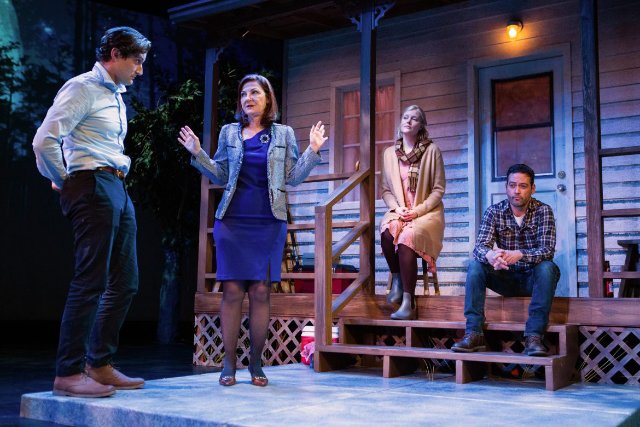Heroes of the Fourth Turning by Will Arbery
San Francisco Playhouse
By: Victor Cordell - Feb 04, 2022
Reunions provide great grist for drama. Before and after snapshots of the participants offer scope for character development as they reminisce, revealing not only their shared glories but often how differently those events are remembered. As layers of the onion unpeel, secrets are divulged. We see how some characters move on, while others remain defined by the past.
In Will Arbery’s “Heroes of the Fourth Turning,” four friends converge seven years after graduation to celebrate the installation of a favorite professor as the new president of a fictitious small Catholic university in Wyoming. The playwright knows whereof he speaks, as his father held the same post at the real institution after which the fictional one is modeled.
The script is built around verbal sparring, punctuated by bombastic polemics. Rather than the generalistic, unsupported claims that dominate debate in real life, the arguments are largely supported by academic and religious sources. The play itself is riveting, but not always enjoyable, while the production is world-class, with exemplary performances by each member of a fantastic cast and fine direction and scenic design by Bill English.
One discussion point about the play is that the playwright’s intent is to introduce the liberal-leaning theater crowd to conservatives that are full-featured and even likeable. Judge for yourself. The action occurs outside the country cabin of Justin (Johnny Moreno), a dark and moody gun-loving libertarian who seems like he could erupt at any time. His affable college roommate, Kevin (Josh Schell), sells religious books in Oklahoma. The actor admirably appears drunk for the full two hours and fifteen minutes during which his general weakness and specific neediness for a girlfriend arises again and again.
The angelic Emily (Wera von Wulfen) has suffered constant and sometimes incapacitating pain for several years from deer tick fever. To liberals, she is the golden hope who befriends and respects others with different opinions. Her foil, and the pivotal character, is Teresa (Ash Malloy), now living in Brooklyn. An exemplar of Eric Hoffer’s “The True Believer,” her identity is absorbed by conservative, nay, reactionary Catholicism. She sets the rules and brooks no compromise, for instance, insisting on calling abortion supporters murderers. As fanatical and fractious an advocate as she is for her beliefs, one could see her being just as passionate for communism, ecology, or anything else she was exposed to at the right developmental point. A late arrival to the party, the incoming president, Gina (Susi Damilano), relates cordially to her former students, but still uses the power of position to dominate when necessary and promote principle with compromise.
Many liberals may find the early part of the play particularly depressing with its unrelenting reinforcement of an alienating philosophy. Oddly, seeing a parallel scenario taking place in Hindu India or Moslem Egypt might be better received by the left-leaning as exotic, educational, and non-threatening. But to those not closely exposed to the resolute and divisive thinking of what could be considered extremism within our midst, there might be a sense of dismayOver time, the discussion turns to even more disturbing views, but counterpoint is also rendered. The desirability of empathy is questioned in the play. Paradoxically, San Francisco Playhouse promotes itself as a place of empathy. Racism is cloaked in deceptive garb, but antipathy for LGBT is not. Whites, and particularly Catholics, are presented as martyrs (maybe they haven’t observed the composition of the Supreme Court, Congress, the Presidency, or corporate America). Attributions to non-Catholics’ motivations are horrifying. A torturously feeble defense of supporting the anti-Christ, Donald Trump, is given. And there is more. Perhaps one reason that the United States seems to be losing its way as a society is that a significant portion of the population views another portion as the enemy more so than threats like Russia and Covid. We may realize that the thoughts of these characters do occur, but to see vivid depictions of well-educated young people harboring these thoughts is chilling.
Although the setting clearly draws from the playwright’s own experience, its symbolism cannot be ignored. Wyoming is the least populated and one of the most isolated states in the country. Its people are among those who consider themselves to be the real Americans, despite the fact that the state is grossly unrepresentative and has been a net recipient rather than contributor to the nation’s economic and intellectual health. It serves as an ideal crucible for segregation and indoctrination that might be associated with a parochial school.
Finally, there is the matter of the title of the play. It derives from the book “Generations” by William Strauss and Neil Howe. The authors postulate in great, but highly questionable, detail that cycles of history with four phases repeat every 80-90 years. Certainly, the notion of cycles has its own long history and is loosely demonstrable. The question is whether the theory should be observed in order to understand current events or whether it should be accepted as deterministic and allowed to dictate our actions in order to fulfill its prophecy.
“Heroes of the Fourth Turning” is well produced; highly provocative; dense with scholarly detail; and even has a few unexpected turnings of its own. But be prepared for something that may be outside your normal comfort zone.
“Heroes of the Fourth Turning” is written by Will Arbery, produced by San Francisco Playhouse, and plays on its stage at 450 Post Street, San Francisco, CA through March 5, 2022.

